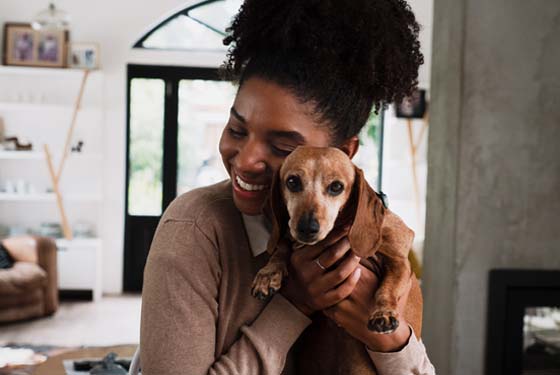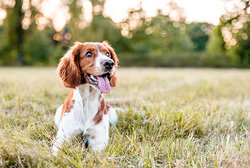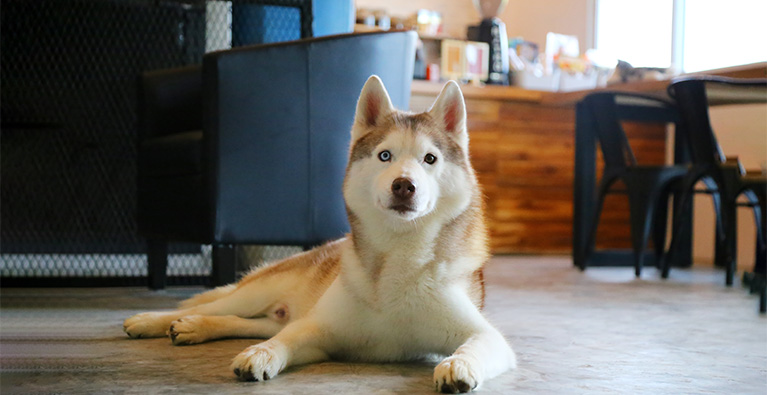A dog in the office
Scientific studies have shown that dogs have a positive effect on well-being and productivity in the workplace. One prerequisite for this, however, is that the dog and its owner are a well-rehearsed and responsible team.
What are the advantages of having a dog in the office?
In a study, the American professor Randolph Baker came to the conclusion that having a dog in the office lowers the stress level of the staff. This has a positive effect on their ability to concentrate and to work well. There is also less sick leave and a reduced risk of burnout. So there are benefits for both the employees and the employers. This can also be seen in the working atmosphere: A dog gives the staff something to talk about, promotes team spirit, makes it easier to connect with other employees and provides variety. It also demonstrates that a company is modern and open-minded. When it comes to the struggle to attract the best employees, allowing dogs in the office can prove to be the factor that tips the scales in your favour. This is why more and more companies are deciding to allow dogs in the workplace.
Are dogs always allowed in an office?
People are not automatically allowed to have their dog with them in the office! This is up to the employer alone. Once the employer has given their permission in principle, they remain free to decide whether to ban a particular dog as a result of any specific incidents. This is because the employer has a legal duty of care for all their employees. So if a dog disrupts any work routines, tends to bark a lot, easily becomes agitated, has an unpleasant smell, frightens colleagues or triggers an allergy in a member of staff, then the dog owner must accept that they will no longer be allowed to have their dog in the office with them. It is therefore important to give a lot of thought to the “dog in the office” project.

Which dogs are suitable for an office?
Calm, well-behaved dogs are ideal for the office. It can also be an advantage if the dog is not too big, because it could scare some members of staff – even if the dog is friendly and as gentle as a lamb. Puppies and young dogs are unsuitable for a long day at the office. They still need a lot of attention, are very playful and are not yet fully trained. If you do not want to run the risk of your dog being banished from the office, you should make sure that your pet listens to you and is obedient. All the basic commands should always work perfectly even when the dog is distracted. And if you have to leave your workplace temporarily, it is important that the dog lies quietly and does not disturb anyone.
Tip: It is also important that the dog has all the required vaccinations and no contagious diseases, and that it is dewormed regularly.
How can I get my dog used to the office?
If you have been given permission to take your dog with you into the office, it is a good idea to try it out first and to take things slowly. Maybe you have the opportunity to come into the office for a few hours on your day off or to just work a half day. If this is not possible, then you will have to test the day in the office under normal conditions. In any case, you should ensure that you are well prepared: Take a dog bed or perhaps even a comfortable kennel with you to provide your dog with a place of retreat. And do not forget a water bowl, a food bowl, chew bones and plenty of toys. Avoid squeaky toys and make sure that the food does not have a strong smell. Choose a place in the office that is close to you and where your dog feels safe and at ease. It should not be a place where people walk by all the time, nor should the dog be in a draught or near a frequently used printer. It is also important that all the staff respect the space as a place of retreat and not disturb your dog while it is sleeping.
How can I keep my dog occupied in the office?
You will want to be able to go about your work with a minimum of disruption, so it is all the more important that the dog is as calm and relaxed as possible before your day together in the office. A long walk could be the ideal solution here, preferably with a few play sessions. Dogs often tend to sleep for a lot of the day anyway, but sooner or later they will wake up again. You will then be able to keep your dog occupied for a while with a chew bone or an intelligence toy. And when lunchtime finally arrives, it is, of course, time for another short walk. Maybe you also have a colleague who would like to take your dog for a little walk in the mornings or afternoons. Obviously, the dog has to be fully socialised, but this should be the case for an office dog anyway. And when the working day is finally over, the dog has earned a lot of praise and another walk. This is the reward for lying in its basket for hours on end, and will ensure that your dog will look forward to spending another day in the office with you tomorrow.
You may also like this

Teaching your dog the commando "Down"
“Down!” is one of the most important commands a dog should master

Deworming dogs
Regular deworming is useful

Kepping your dog occupied
Occupation is important for a dog.

Leaving your dog alone
How to practice leaving your dog alone

